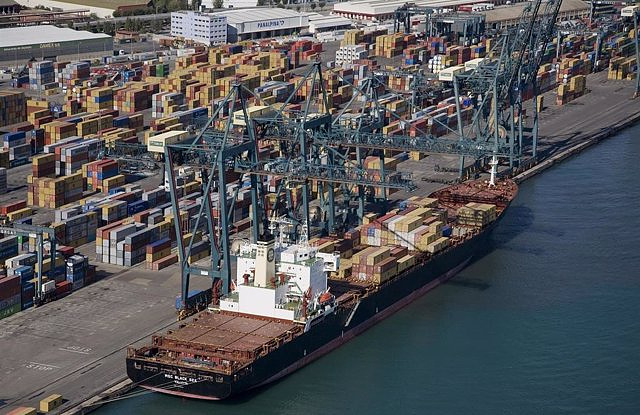Globally, geopolitical instability and conflict are still considered the main risk, according to the McKinsey Global Survey
MADRID, 10 Oct. (EUROPA PRESS) -
The expectations of companies in Europe about how the world economy will evolve in the next six months worsened in the third quarter of 2023 compared to the previous quarter, while in North America optimism has grown, according to the latest Global Survey by the consulting firm McKinsey
In general, opinions on the state of the economy, both retrospective (the last six months) and prospective, are more positive than negative for the second consecutive quarter, according to the results of the survey, in which 997 managers and senior officials were asked from companies from all world regions, sectors, company sizes, functional specialties and occupations between August 31 and September 8.
However, their views on the current and future conditions of the global economy have converged and there is a more even split between optimism and pessimism. Additionally, respondents are also more hopeful than discouraged about their countries' national economies, although results vary widely by region.
Likewise, among those interviewed there is a more positive than negative view regarding how the economies of their countries have changed in the last six months. By region, in North America the evaluations are now more positive than in the previous two quarters, while in Asia-Pacific the opposite is true. Companies in India and Europe were more optimistic in June than in March, but have since become more cautious.
The study also indicates that European managers who expect their country's economy to improve are far fewer than those who responded this way in studies published by McKinsey in March and June, and are currently the least optimistic group of all the regions analyzed. For their part, companies in India and North America are more hopeful than before about the future.
Regarding risks to the economy, geopolitical instability and inflation continue to be two of the most mentioned in the McKinsey Global Survey, both for the global economy and for national economies. In the case of the global economy, the greatest risk continues to be, for the sixth consecutive quarter, geopolitical instability and conflicts.
But study participants, especially those in the Asia-Pacific region, are also keeping a close eye on China. The economic slowdown in this country is perceived as an important risk both for the global economy - the second most cited - and for national economies, where it is one of the five risks that generate the most concern.
Likewise, inflation continues to represent a significant risk to the growth of both the global economy and national economies, according to the survey results. In Europe, concern about this problem in relation to national economies has surpassed that produced by geopolitical conflicts, placing this issue in first place.
For North American companies, inflation is the main threat, but internal political conflicts are increasingly worrying them and are taking second place. On the other hand, in the June study, the rise in interest rates and geopolitical instability seemed more alarming than internal political conflicts.
Internal political clashes are also of particular concern in India, along with geopolitical conflicts, one of the most mentioned risks in 2023.
Overall, the proportion of respondents expressing concern about the effects of rising interest rates on the economy has decreased. This issue, which was one of the three most cited in June when referring to the world economy, is now in the 'top 7', and is also no longer among the three main risks for national economies.
The percentage of respondents who foresee interest rate increases in their respective countries continues to decline, something that has occurred since September 2022.
On the other hand, McKinsey asked managers about the perspectives they have for their companies. Most are optimistic, and the proportion of those who expect an increase in profits in the coming months - two-thirds - is the highest recorded since the end of 2021. Likewise, most believe that demand will continue to increase.
Finally, the consultant wanted to know what plans private companies have in relation to their office space. Nearly 30% of respondents predict that their companies will have more space, owned or leased, in the next two years, and another 30% believe that the space they use will decrease.
Even for those who predict an increase in their workforce in the next six months, the possibility of expanding office space is not a sure thing: only half believe that space will increase.
Many of the senior executives who predict a reduction in office space explain that their companies are implementing remote work or flexible work policies, redesigning offices and selling or subleasing underused spaces.

 Exploring Cardano: Inner Workings and Advantages of this Cryptocurrency
Exploring Cardano: Inner Workings and Advantages of this Cryptocurrency Seville.- Economy.- Innova.- STSA inaugurates its new painting and sealing hangar in San Pablo, for 18 million
Seville.- Economy.- Innova.- STSA inaugurates its new painting and sealing hangar in San Pablo, for 18 million Innova.- More than 300 volunteers join the Andalucía Compromiso Digital network in one month to facilitate access to ICT
Innova.- More than 300 volunteers join the Andalucía Compromiso Digital network in one month to facilitate access to ICT Innova.-AMP.- Ayesa acquires 51% of Sadiel, which will create new technological engineering products and expand markets
Innova.-AMP.- Ayesa acquires 51% of Sadiel, which will create new technological engineering products and expand markets Hamas views Israel's latest deal proposal in "positive spirit"
Hamas views Israel's latest deal proposal in "positive spirit" The Ibex 35 rises 0.22% mid-session driven by Aena (4.66) and Sabadell (4.57%)
The Ibex 35 rises 0.22% mid-session driven by Aena (4.66) and Sabadell (4.57%) STATEMENT: Selena Romero and Roberto Pérez winners of the 22nd Nacho Juncosa Memorial - International under-16 tennis tournament
STATEMENT: Selena Romero and Roberto Pérez winners of the 22nd Nacho Juncosa Memorial - International under-16 tennis tournament STATEMENT: DH2 Energy is the winner in the first European renewable hydrogen auction
STATEMENT: DH2 Energy is the winner in the first European renewable hydrogen auction How Blockchain in being used to shape the future
How Blockchain in being used to shape the future Not just BTC and ETH: Here Are Some More Interesting Coins Worth Focusing on
Not just BTC and ETH: Here Are Some More Interesting Coins Worth Focusing on UPV students design an app that helps improve the ventilation of homes in the face of high temperatures
UPV students design an app that helps improve the ventilation of homes in the face of high temperatures Ivace and promotes a less invasive device for the early detection of prostate cancer
Ivace and promotes a less invasive device for the early detection of prostate cancer Valencia unanimously approves the ordinance to allocate spaces to test innovative initiatives
Valencia unanimously approves the ordinance to allocate spaces to test innovative initiatives UPV researchers promote a paid master's degree as a "talent factory" in integrated photonics
UPV researchers promote a paid master's degree as a "talent factory" in integrated photonics A million people demonstrate in France against Macron's pension reform
A million people demonstrate in France against Macron's pension reform Russia launches several missiles against "critical infrastructure" in the city of Zaporizhia
Russia launches several missiles against "critical infrastructure" in the city of Zaporizhia A "procession" remembers the dead of the Calabria shipwreck as bodies continue to wash up on the shore
A "procession" remembers the dead of the Calabria shipwreck as bodies continue to wash up on the shore Prison sentences handed down for three prominent Hong Kong pro-democracy activists
Prison sentences handed down for three prominent Hong Kong pro-democracy activists ETH continues to leave trading platforms, Ethereum balance on exchanges lowest in 3 years
ETH continues to leave trading platforms, Ethereum balance on exchanges lowest in 3 years Investors invest $450 million in Consensys, Ethereum incubator now valued at $7 billion
Investors invest $450 million in Consensys, Ethereum incubator now valued at $7 billion Alchemy Integrates Ethereum L2 Product Starknet to Enhance Web3 Scalability at a Price 100x Lower Than L1 Fees
Alchemy Integrates Ethereum L2 Product Starknet to Enhance Web3 Scalability at a Price 100x Lower Than L1 Fees Mining Report: Bitcoin's Electricity Consumption Declines by 25% in Q1 2022
Mining Report: Bitcoin's Electricity Consumption Declines by 25% in Q1 2022 Oil-to-Bitcoin Mining Firm Crusoe Energy Systems Raised $505 Million
Oil-to-Bitcoin Mining Firm Crusoe Energy Systems Raised $505 Million Microbt reveals the latest Bitcoin mining rigs -- Machines produce up to 126 TH/s with custom 5nm chip design
Microbt reveals the latest Bitcoin mining rigs -- Machines produce up to 126 TH/s with custom 5nm chip design Bitcoin's Mining Difficulty Hits a Lifetime High, With More Than 90% of BTC Supply Issued
Bitcoin's Mining Difficulty Hits a Lifetime High, With More Than 90% of BTC Supply Issued The Biggest Movers are Near, EOS, and RUNE during Friday's Selloff
The Biggest Movers are Near, EOS, and RUNE during Friday's Selloff Global Markets Spooked by a Hawkish Fed and Covid, Stocks and Crypto Gain After Musk Buys Twitter
Global Markets Spooked by a Hawkish Fed and Covid, Stocks and Crypto Gain After Musk Buys Twitter Bitso to offset carbon emissions from the Trading Platform's ERC20, ETH, and BTC Transactions
Bitso to offset carbon emissions from the Trading Platform's ERC20, ETH, and BTC Transactions Draftkings Announces 2022 College Hoops NFT Selection for March Madness
Draftkings Announces 2022 College Hoops NFT Selection for March Madness























